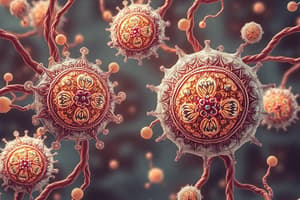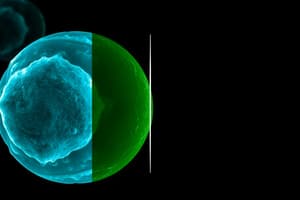Podcast
Questions and Answers
Why is cell division important for both unicellular and multicellular organisms?
Why is cell division important for both unicellular and multicellular organisms?
It is the only way for unicellular organisms to reproduce; multicellular organisms need cell division to grow and replace dead or damaged cells.
What is differentiation?
What is differentiation?
When cells stop dividing to specialize in function and structure.
What is apoptosis and its purpose?
What is apoptosis and its purpose?
Programmed cell death that eliminates unnecessary cells during development and removes unhealthy or damaged cells in the mature organism.
What are cell cycle regulators?
What are cell cycle regulators?
What is the purpose of a checkpoint in the cell cycle?
What is the purpose of a checkpoint in the cell cycle?
Stimulatory proteins are encoded by what?
Stimulatory proteins are encoded by what?
Inhibitory proteins are encoded by what?
Inhibitory proteins are encoded by what?
Describe two reasons why cells can form tumors.
Describe two reasons why cells can form tumors.
To cause cancer, proto-oncogenes require _____ alleles to be mutated and therefore are considered _________. The mutation results in a ____ of function.
To cause cancer, proto-oncogenes require _____ alleles to be mutated and therefore are considered _________. The mutation results in a ____ of function.
To cause cancer, tumor suppressor genes require _____ alleles to be mutated and therefore are considered ________. The mutation results in a ____ of function.
To cause cancer, tumor suppressor genes require _____ alleles to be mutated and therefore are considered ________. The mutation results in a ____ of function.
Flashcards are hidden until you start studying
Study Notes
Importance of Cell Division
- Essential for unicellular organisms for reproduction.
- Crucial for multicellular organisms to grow and replace dead or damaged cells.
Differentiation
- Process where cells stop dividing.
- Involves specialization in function and structure.
Apoptosis
- Defined as programmed cell death.
- Eliminates unnecessary cells during development.
- Removes unhealthy or damaged cells in mature organisms.
Cell Cycle Regulators
- Molecular signals that control cell division.
- Can stimulate or halt division, direct differentiation, or initiate cell death.
Purpose of Cell Cycle Checkpoints
- Serve to identify and eliminate cells with mutations.
- Ensure that only healthy cells proceed through the cycle.
Stimulatory Proteins
- Encoded by proto-oncogenes.
- Example: Anaphase promoting complex/cyclosome, which promotes orderly progression through cell division.
Inhibitory Proteins
- Encoded by tumor suppressor genes.
- Example: Ataxia telangiectasia mutated (ATM) protein, which helps prevent uncontrolled cell division.
Tumor Formation
- Can occur due to excessive cell division or inadequate cell death.
- Imbalance in these processes leads to uncontrolled cell proliferation.
Proto-oncogenes and Cancer
- Require mutations in both alleles to promote cancer.
- Considered dominant; mutations result in gain of function.
Tumor Suppressor Genes and Cancer
- Require mutations in both alleles for cancer development.
- Considered recessive; mutations result in loss of function.
Studying That Suits You
Use AI to generate personalized quizzes and flashcards to suit your learning preferences.




